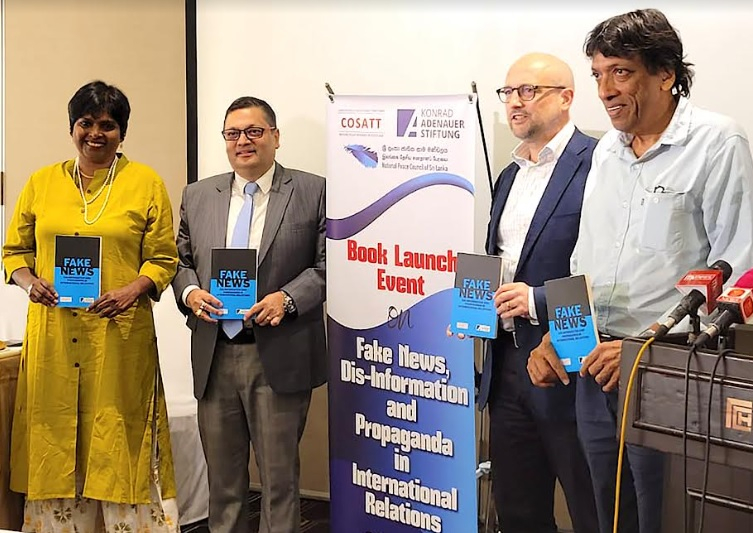
A panel discussion followed by a book launch on Fake News, Dis-Information and Propaganda in International Relations was organized by NPC in cooperation with the Nepal-based Consortium of South Asian Think-Tanks (COSATT) with funding from Konrad Adenaur Stiftung (KAS) in Colombo.
The background on the book was given by Dr. Nishchal N. Pandey, Convener of COSATT. Andreas Klein, Director, Political Dialogue Asia Programme, KAS, Singapore explained the rationale for the project. This was followed by an outline of fake news and disinformation in the regional context by Dr. Mallika Joseph of Women in Security, Conflict Management and Peace, New Delhi.
The speakers made the point that the papers in the book point to the challenge of dealing with fake news, disinformation and propaganda through a multi-faceted approach that combines media literacy education, fact checking initiatives, technological solutions, and international cooperation to promote transparency, critical thinking and responsible information sharing.
Fake news refers to fabricated or misleading information presented as genuine news. It can take the form of false headlines, manipulated images or even entirely fictional stories.
The proliferation of fake news is often driven by the desire to generate web traffic, earn advertising revenue or manipulate public opinion. In international relations, fake news can be used to shape narratives, distort facts or advance strategic objectives.
However, legislation to tackle the problems of disinformation, which involves the deliberate spread of false or misleading information to deceive or manipulate others, needs to be carefully assessed so that it does not lead to an erosion on the rights to free expression and to receive information.
Unlike fake news, disinformation campaigns are often sophisticated, coordinated efforts aimed at achieving specific political, economic or ideological goals. Disinformation tactics can include the creation of fictional personas, the use of social media bots to amplify certain messages or the strategic release of selectively leaked information.
In addition, there is propaganda, which is the systematic dissemination of information, ideas or narratives to shape public opinion and promote a particular agenda. These methods are employed by governments, political parties and other organizations to influence perceptions, mobilise support and advance their interests.
Propaganda often employs emotionally charged language, appeals to patriotic or ideological values, and seeks to create a sense of unity or shared purpose. Propaganda can be used to demonise adversaries, justify military actions or build alliances by promoting positive images of a country or its leadership.
The key note addresses were followed by a panel discussion on Sri Lanka’s experience with fake news, disinformation and propaganda in international relations. Prof. Prathiba Mahanamahewa, Rector, Sri Pali Campus, University of Colombo, Prof. N. Selvakkumaran, former Dean, Faculty of Law, University of Colombo and presently member of the Public Service Commission and Ambassador Javid Yusuf, Director, NPC made presentations followed by discussion.
The situation in Sri Lanka with regard to the Online Safety Bill was delved into with most of those who expressed their opinion opposing the threat it posed to freedom of expression.
